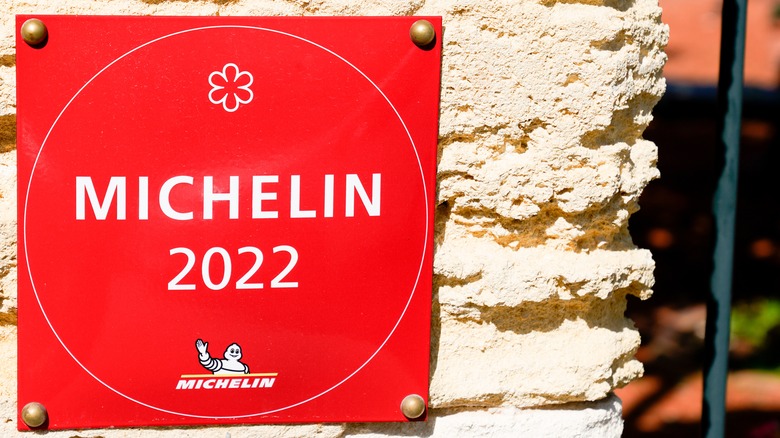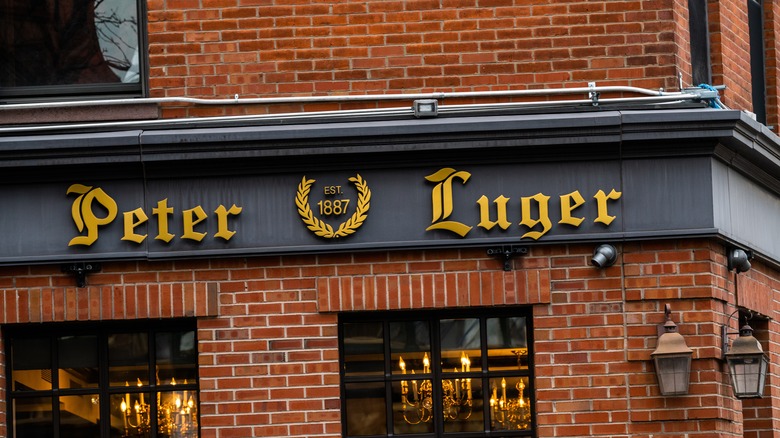Why These Famous Restaurants Lost Their Michelin Stars
It is one of life's strange predicaments that the most prestigious of gastronomic awards does not come from chefs or a prominent food publication but from a tire manufacturing company. Peculiar or not, Michelin stars carry weight; a prestige that can transform a restaurant's reputation overnight.
Gaining Michelin stars is the goal of many restaurants, but it is easier said than done. As The Michelin Guide highlights, restaurants are judged on a number of aspects including mastery of cooking techniques and the consistency of the food. All must be perfect for stars to be awarded.
As they are judged annually, a restaurant's Michelin rating is never assured. Every year, some restaurants experience the joy of winning stars. Others feel the devastation of losing them. While Michelin never reveals the exact reasons why a restaurant was demoted, many chefs, managers, and members of the press are able to draw their own conclusions. Whether this softens the blow at all is another question entirely.
Gordon Ramsay at the London
The Daily Mail reports that few celebrity chefs actually work in the kitchens of their own restaurants. Instead, these busy individuals rely on trusted staff to run all aspects of the business in their name. To ensure all standards are upheld, these celebrities frequently visit their restaurants. The majority of iconic chefs, like Gordon Ramsay, manage their vast empires in this way.
Occasionally, famous chefs have even less involvement in the restaurants that bear their name. Ramsay cut ties with the two-Michelin-star Manhattan restaurant, Gordon Ramsay at the London, after selling his stake in 2009. As part of the deal, the restaurant continued to use the chef's name and retained the two Michelin stars it had previously won. Four years later, the restaurant was stripped of both its Michelin stars amid suggestions that standards had slipped since the celebrity chef walked away.
A spokesperson for Ramsay reinforced this view by releasing the following statement to The Caterer: "We are heavily involved with all our restaurants and partners around the world with the exception of the London, who unfortunately rarely co-operate or communicate with us [...] we believe the dining experience they've been offering lately has not been the standard expected by us or our customers when they dine at a Gordon Ramsay restaurant."
Mourad
The restaurant industry was turned upside down by the coronavirus pandemic. Despite the turmoil, Michelin upheld its rigorous testing standards once restaurants reopened. As CNN reports, this decision caused some controversy in the industry. Unfortunately, some restaurants were unable to uphold pre-pandemic standards and subsequently had their Michelin stars taken away. Mourad, a Moroccan restaurant in San Francisco, was one such establishment.
Owner and chef Mourad Lahlou explained the challenges which contributed to Mourad losing its one-star rating: "In 2021 (when Mourad reopened) it was really hard to come back from the pandemic. A restaurant this big — we employed over 100 people. A lot of people left the industry. There was a huge exodus. At that point we didn't care about anything other than surviving. Are we going to be able to open tomorrow? Are we going to be able to pay our vendors and our staff in two weeks? Our concerns were not whether we should be awarded a star or two stars or make a list. Let's survive first." (via San Francisco Chronicle).
Mourad remains open and has not let the loss of its Michelin star affect the quality of food or service. SFGate notes that the restaurant was recently named a semi-finalist for a prestigious James Beard award in the Outstanding Restaurant category. This indicates to us that regaining the lost Michelin star is a real possibility.
Fäviken
One of the prerequisites for Michelin stars being awarded is that the restaurant in question has not closed or rebranded. Due to the huge commitments required, many Michelin-starred restaurants have relatively short life spans. This sees a large number of Michelin stars handed back every year as chefs and owners call it a day. Among those shuttered in 2019 was Fäviken, a two-Michelin-star restaurant run by chef Magnus Nilsson.
Speaking to Robb Report, Nilsson indicated that burnout was the reason he closed Fäviken: "It's quite difficult to explain this to a lot of people — they think there was something wrong along the way or some other external reasons. But I didn't enjoy it anymore. I didn't wake up in the morning and say, 'Hell yes, this is going to be a great day, I can't wait to work.'"
The same publication reports that Nilsson has steered clear of running restaurants since he closed Fäviken. Instead, he devotes his time to running an orchard, an endeavor that, while devoid of Michelin stars, is probably less stressful than trying to consistently impress the Guide.
Le Suquet
While Magnus Nilsson closed Fäviken to escape the stresses of restaurant life, there are others who seek to alleviate the pressure without giving up their restaurants. Sébastien Bras, the chef at three-Michelin-starred Le Suquet, solved this conundrum by asking that his restaurant be left out of the 2018 Michelin Guide. This request was heeded and Le Suquet lost its three-star status for the first time in 18 years, as per Big Hospitality.
Bras explained the reasoning behind his request to Fine Dining Lovers: "After twenty years under the banner of three stars I wanted to find serenity, freedom, and independence [...] I am very grateful for what the guide brought to Suquet. But these three stars represented a form of permanent and growing tension. I wanted to rediscover the real reasons that made me choose this job: the sense of sharing, the love of cooking, and a territory."
To Bras' surprise, two Michelin stars were awarded to Le Suquet in the 2019 Michelin Guide. In an interview with Centre Presse Aveyron Bras highlighted his displeasure at the decision and once again lamented the pressure that the guide heaped upon restaurants.
The Dining Room at Whatley Manor
Many chefs see the loss of a Michelin star as a damning critique of their work. However, there are some circumstances when losing a star is expected, the changing of executive chefs being the most prominent example. In these situations retaining any previous accolades is a huge achievement.
This sentiment was expressed by Ricki Weston, the new executive chef at The Dining Room when it lost one of its two Michelin stars last year: "I'm super happy. To have support from Michelin so early on in my tenure is amazing. Some might see it as a deletion, but with a new menu and a new chef, we can't compare what we are doing now to the offering there was before [...] This is a fantastic achievement for the whole team." (via Big Hospitality).
Weston and the team at The Dining Room seem determined to recover their lost star. Big Hospitality also reports that Weston's tenure is off to a good start with the AA awarding The Dining Room four rosettes. While not a second Michelin star, this accolade indicates that The Dining Room is producing some of the best food in the United Kingdom.
The Restaurant Marco Pierre White
The Restaurant Marco Pierre White was one of the most famous establishments of the 1990s. In 1995 it received three Michelin stars, making White, at age 33, one of the youngest chefs to achieve the feat. A further three years of work were required for The Restaurant Marco Pierre White to be awarded three Michelin stars and five red knives and forks, which are further awards that indicate maximum comfort, brilliant décor, and perfect service, as per The Guardian.
Just one year later, White gave all his accolades back when he retired from life as a chef. White explained the reasons behind his decision to Destinations of the World News: "I never wanted to live a lie — I didn't want to be one of those chefs who pretends he is behind the stove when he is not. I didn't want to question my integrity and everything I had worked at for 22 years. I had done my bit for my industry and I had realized my dream — I was still a young man in my 30s and I wanted to go on and do other things."
The Restaurant remained open under chef Robert Reid for two years after White's retirement. The year following White's departure The Restaurant was awarded a single Michelin star, although Reid felt they deserved two (per The Telegraph).
L'Auberge du Pont de Collonges
Iconic French chef Paul Bocuse took over his family's restaurant, L'Auberge du Pont de Collonges, in 1959 (via Britannica). Over the following decades he would transform French cuisine from the restaurant's kitchen and bring acclaim to both his name and L'Auberge du Pont de Collonges. Just nine years after Bocuse took over, L'Auberge du Pont de Collonges was awarded three Michelin stars, a rating it would hold for a record 55 years.
Bocuse passed away in January 2018. Only two years later it was announced that L'Auberge du Pont de Collonges had been stripped of its third star. According to The Washington Post, the director of the Michelin Guide, Gwendal Poullennec, traveled to L'Auberge du Pont de Collonges to break the news in person. Speaking to the same publication Poullennec said: "Obviously, there was a lot of emotion [...] The difference between two and three stars is that three means a true culinary experience of irreproachable quality. This is a variation in the level of the cuisine, but it remains excellent."
Sukiyabashi Jiro
Run by sushi-making legend and near centenarian Jiro Ono, Sukiyabashi Jiro is thought to be among the finest sushi restaurants in the world. Located in Tokyo, Sukiyabashi Jiro was awarded three Michelin stars in 2007, the first year the guide examined restaurants in the Japanese capital. The restaurant retained these stars over the next 12 years.
In 2019 the Michelin Guide reported that Sukiyabashi Jiro was being removed from the guide and effectively losing its three-star status because it no longer served the general public. A spokesperson for the guide stated: "We recognize Sukiyabashi Jiro does not accept reservations from the general public, which makes it out of our scope [...] Michelin's policy is to introduce restaurants where everybody can go to eat" (via The Guardian).
Customers wishing to secure a reservation in the ten-seat restaurant currently have to book through the concierge desks of Tokyo's luxury hotels. Exceptions can be made for those with connections to the chef. Some people believe this exclusivity has arisen from Ono's growing fame. He starred in the 2011 documentary "Jiro Dreams of Sushi" and had both Prime Minister Shinzo Abe and President Barack Obama as customers in 2014.
Hawker Chan
Chef Chan Hon Meng's hawker restaurant, now known as Hawker Chan, was awarded a Michelin star in 2016. The restaurant's iconic soy sauce chicken dish became the cheapest — and for a moment, the most famous — Michelin-starred meal in the world. Meng capitalized on the opportunity and expanded from one stall to a culinary empire of 12 restaurants located in six different countries, as per Hawker Chan.
Some blame this rapid expansion for Hawker Chan losing its Michelin star in 2021. However, Chan was reflective when The Peak asked him about losing the star: "Having retained the star for five years, it is challenging to hold on to the star for so long. Nothing lasts forever — especially when it comes to food, when it is determined by so many factors like the ingredients and manpower."
When mentioning ingredients, Chan is likely alluding to the Malaysian chicken export ban which limited the amount of chicken available to many Singaporean hawker stalls. Chan even had to use frozen chicken before the ban was lifted. As one of the restaurant's main ingredients, it is not difficult to see how this would have affected the quality of his food.
Peter Luger Steak House
Three years before Peter Luger lost its only Michelin star, the restaurant's reputation was rocked by a cutting zero-star review from Pete Wells of The New York Times. In this review, Wells complained about unevenly cooked food, rude waiting staff, and astronomical pricing.
The long list of gripes did little to upset general manager David Berson. In a statement made to Eater New York, he said: "We know who we are and have always been. The best steak you can eat. Not the latest kale salad. We're grateful to our customers who continue to pack our house every single day, and especially to our regulars whose emails of encouragement continue to flood our inbox." Berson did not release a similar comment after Michelin stripped Peter Luger of its star.
While the Michelin Guide did not reveal why Peter Luger lost its star, it is reasonable to suggest that one or more of the factors Well' complained about was to blame. As the Michelin Guide prizes consistency, the public's wildly differing opinions on the steak house also suggest a further reason for losing the Michelin star: a lack of consistency.
Blue Duck Tavern
Based in Washington, D.C., Blue Duck Tavern is a study in farm-to-table eating. Menus include detailed information on where ingredients are sourced from and everything served is both local and seasonal. When combined with high-quality cooking and immaculate service, it is easy to see why Blue Duck Tavern was initially awarded a Michelin star in 2016, per DCist.
Unfortunately, Blue Duck Tavern only held onto the star for three years. In an anonymous interview with The Washington Post, one Michelin Guide reviewer highlighted that the food at Blue Duck Tavern lacked the technique and quality necessary to maintain the Michelin star. This is a piece of feedback that would be hard for any chef to take.
Eater Washington DC reported that Adam Howard, executive chef of Blue Duck Tavern, left the establishment a few months after losing the star. He cited a desire to spend more time with his family. Jean-Claude Plihon was hired in his place.
The Araki
The Araki is one of London's premier sushi restaurants, launched by master sushi chef Mitsuhiro Araki in 2014. Receiving great acclaim from the day it opened, The Araki went on to earn three Michelin stars. For those that knew Mitsuhiro Araki this was no surprise; the chef previously owned a three-Michelin-star sushi restaurant in Tokyo.
In 2019, Mitsuhiro Araki left The Araki to open a new venture in Hong Kong. As a result, The Araki lost all three Michelin stars in one fell swoop: "We take it as a fair judgment and a fresh start following the departure of our master Mitsuhiro Araki." said protégé and new head chef Marty Lau. "We believed it placed Michelin in a difficult position to make a decision on how to score The Araki, as the master was here during half of the inspection period for 2020's guide. It's their guide, and we're in total respect of how they want to do it. I'm taking it on the chin and getting on with proving myself." (via CNN).
Despite Lau and his team dedicating themselves to their work, The Araki has not regained any of its stars. In contrast, Mitsuhiro Araki's new venture in Hong Kong was awarded one Michelin star in 2021.
Maison des Bois
Maison des Bois is the third restaurant run by chef Marc Veyrat to be awarded three Michelin stars. It achieved this in 2018 thanks to Veyrat's advanced style of cooking and the use of foraged ingredients from the nearby French Alps. Just one year later, Maison des Bois found itself demoted to two Michelin stars, a decision which incensed Veyrat.
When the Michelin Guide published its new rating, Veyrat sued the organization. He lost the case because he could not prove he or his business suffered from material damage as a result of the rating.
Veyrat seems sure that the inspector's judgment was at fault and not his cooking. According to France 24, Veyrat stated to France Inter Radio that inspectors had mistaken a blend of three French cheeses used in a soufflé as cheddar: "I put saffron in it, and the gentleman who came thought it was cheddar because it was yellow. That's what you call knowledge of a place? It's just crazy."













